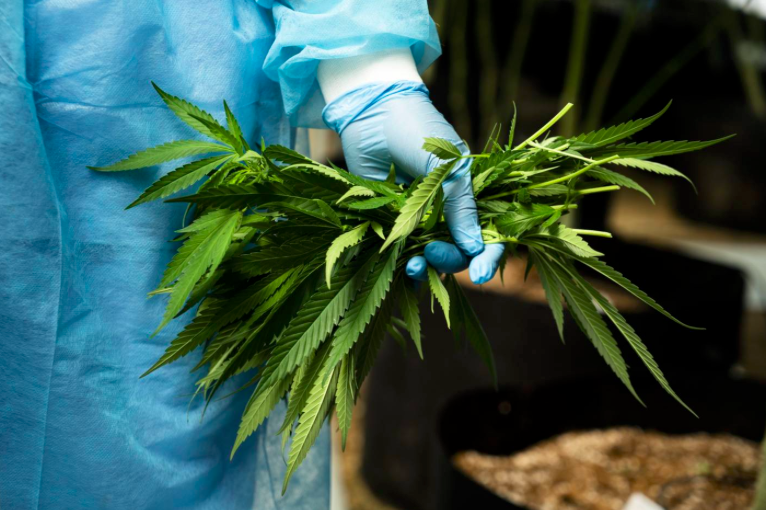The promise of medicinal cannabis has not been fully fulfilled in Colombia since the suspension of financing for master preparations by the previous government puts barriers for Colombians to access these products through the Health Benefits Plan (PBS), exerting pressure on the finances of the sector and pushing patients “into illegality,” the Vice President of Regulatory Affairs of the Zerenia clinic, Juan Diego Álvarez, said in an interview with Bloomberg Línea.
The medicinal cannabis industry in Colombia is waiting for a statement from the Ministry of Health in order to be clear about these points and attend to patients who today are displaced towards the consumption of artisanal products.
“The current situation is that the Ministry of Health has not officially ruled on the source of financing for masterful preparations with cannabis, which are the only category of product that is currently available to patients,” said Álvarez.

This situation could lead to the closure of this medical cannabis treatment clinic, the first of its kind in the country, since it would not be able to subsidize these therapies, according to this entity owned by the Khiron Life Sciences sector company.
Álvarez explains that “despite the fact that these drugs were covered by the health system, the Ministry has decided that it needs to clarify and solidify the financing route for these master preparations.”
“In that sense, the Ministry has made some internal decisions to be able to present public opinion with the most suitable financing route for these products and we are waiting,” said the director of the Zerenia clinic, which began operations in Colombia in 2020.
Currently, compounded preparations are the only product alternative available to patients in the country for many pathologies that do not have a drug with health registration.
To that extent, these preparations are available to those who have the ability to pay with their own resources.
For industry players, this creates an imbalance for the thousands of patients who need these products to treat medical conditions for which medical cannabis is an alternative.
“Therefore, we do believe that not regulating the financing route ends up pushing many of these patients who cannot pay with their own resources into illegality and this is really the worst of all worlds in which we could find ourselves,” said the Vice President of Regulatory Affairs of the Zerenia clinic.
When asked about this issue, the president of the Colombian Association of Cannabis Industries (Asocolcanna), Miguel Samper Strouss, pointed out that “the non-inclusion of these medicines or herbal medicines within health benefit plans means that patients, mainly those with low or medium resources, cannot access them and continue to access products or medications that are more dangerous and that do generate addiction such as morphine or certain opioids.”
“It is really a paradox that having an industry ready to go to market to offer less risky solutions to Colombian patients, they see that possibility shelved because the health system is currently only financing products that are of greater risk to consumers,” he pointed.
A BUREAUCRATIC SWAMP
Although in 2016 Colombia approved the law that regulates the use and commercialization of medicinal cannabis, which initially protected patients who treat their conditions with the plant, there are still several challenges to guarantee access, including the high price of the treatments.
Juan Diego Álvarez told Bloomberg Línea that they have been on several occasions at technical tables with the Ministry of Health in which that entity has clarified that “the route out of this current situation of uncertainty would be an explanatory circular of the financing resolutions based on a concept of the Institute for the Evaluation of Health Technologies (IETS) in which the uses or indications of use of medicinal cannabis are clarified.”
“Beyond a ‘boom,’ I think the important thing to highlight here is that the country has been betting for five years that patients in Colombia have access to a therapeutic alternative that is effective in many treatments, as demonstrated by the evidence. What we cannot do is be entangled in a bureaucratic swamp in which we cannot guarantee that access to medicines for patients,” said Juan Diego Álvarez.
Even so, he pointed out that they believe that “the Government has all the will and the tools to solve this issue promptly and to be able to provide patients with an effective therapeutic alternative through masterful preparations with medicinal cannabis.”
Zerenia details that it has other services with which it currently operates, but recognizes the importance of the bet they have made on medical cannabis to guarantee access to this therapeutic alternative.
Since its foundation, and to date, Zerenia has treated more than 30,000 patients suffering from different medical conditions such as chronic, intractable and oncologic pain, mental health issues, epilepsy, among others.
Likewise, it offers alternatives for many refractory patients, that is, those who have reached the maximum doses of traditional medicines or who do not find therapeutic effects in traditional medicines.
“We are sure that the Government, which has expressed its willingness to solve this issue as soon as possible, will have a response for patients that allows them to access cannabis-based medicines that are approved in Colombia through the system,” concluded Juan Diego Alvarez.
When consulted on this issue, the Colombian Association of Comprehensive Medicine Companies (ACEMI) had not made a statement until the publication of the article.
With information from Bloomberg Línea

